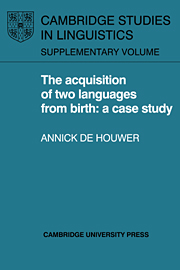Book contents
- Frontmatter
- Contents
- List of tables
- Symbols and abbreviations
- Acknowledgements
- 1 Introduction
- 2 Bilingual first language acquisition: methods and theories
- 3 A new study of bilingual first language acquisition: aims and hypotheses
- 4 Case study of a bilingual child: introduction
- 5 Language choice and Mixed utterances
- 6 The noun phrase
- 7 The verb phrase
- 8 Syntactic analysis
- 9 The morphological and syntactic analyses: a recapitulation
- 10 Metalinguistic behaviour
- 11 Findings and implications
- References
- Appendix
- Index of names
- Frontmatter
- Contents
- List of tables
- Symbols and abbreviations
- Acknowledgements
- 1 Introduction
- 2 Bilingual first language acquisition: methods and theories
- 3 A new study of bilingual first language acquisition: aims and hypotheses
- 4 Case study of a bilingual child: introduction
- 5 Language choice and Mixed utterances
- 6 The noun phrase
- 7 The verb phrase
- 8 Syntactic analysis
- 9 The morphological and syntactic analyses: a recapitulation
- 10 Metalinguistic behaviour
- 11 Findings and implications
- References
- Appendix
- Index of names
Summary
English and Dutch noun phrases are quite similar on the functional level. They express similar meanings and pragmatic functions, and can be used in similar syntactic positions. However, whereas the internal structure of singular noun phrases and the types of items that can feature within them are fairly similar for both adult English and Dutch, there are major differences in the paradigmatic choices that need to be made: in English, a natural gender rule is used which operates on personal and possessive pronouns, but not on articles, adjectives, or demonstrative pronouns. In Dutch, on the other hand, a syntactic gender system largely determines the form of all these five types of elements, in combination with a natural gender rule which applies to some pronominal elements only. In order to approximately speak like most of the people around her, then, one of Kate's main tasks in learning to produce formally acceptable singular noun phrases lies in the marking of syntactic-cum-natural gender in Dutch and the marking of just natural gender in English. Furthermore, Kate will also have to learn that Dutch plurals are more variable in form than English ones, and that Dutch uses a productive diminutive suffix whereas English does not. Just applying the rules from one language to the other, then, will not work: this would result in non-adult-like overgeneralizations, or non-adult-like underextensions.
- Type
- Chapter
- Information
- The Acquisition of Two Languages from BirthA Case Study, pp. 115 - 157Publisher: Cambridge University PressPrint publication year: 1990



